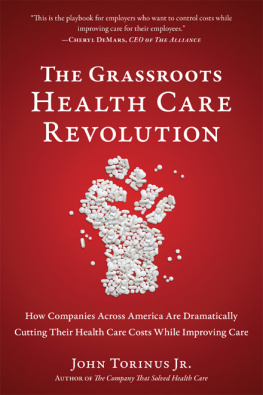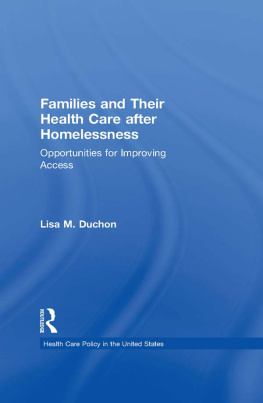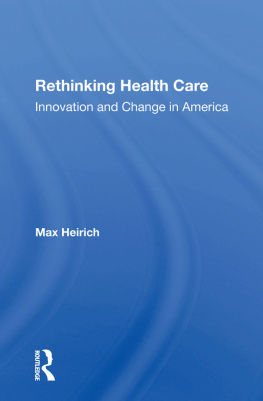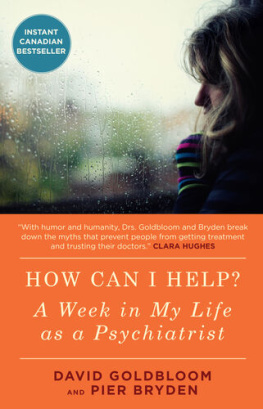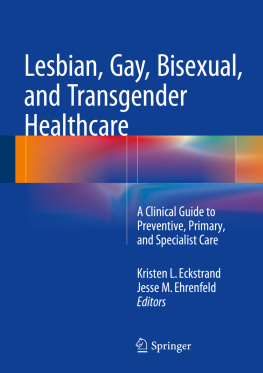Gateways to Improving Lesbian Health and Health Care: Opening Doors
Gateways to Improving Lesbian Health and Health Care: Opening Doors has been co-published simultaneously as Journal of Lesbian Studies, Volume 2, Number 1 1998.
First published 1998 by The Haworth Press, Inc.
This edition first published in 2021 by Routledge
605 Third Avenue, New York, NY 10017
and by Routledge
2 Park Square, Milton Park, Abingdon, Oxon OX14 4RN
Routledge is an imprint of the Taylor & Francis Group, an informa business
Copyright 1998 Taylor & Francis
All rights reserved. No part of this book may be reprinted or reproduced or utilised in any form or by any electronic, mechanical, or other means, now known or hereafter invented, including photocopying and recording, or in any information storage or retrieval system, without permission in writing from the publishers.
Notice:
Product or corporate names may be trademarks or registered trademarks, and are used only for identification and explanation without intent to infringe.
Publishers Note
The publisher has gone to great lengths to ensure the quality of this reprint but points out that some imperfections in the original copies may be apparent.
Disclaimer
The publisher has made every effort to trace copyright holders and welcomes correspondence from those they have been unable to contact.
Cover design by Thomas J. Mayshock Jr.
Library of Congress Cataloging-in-Publication Data
Gateways to improving lesbian health and health care: opening doors / Christy M. Ponticelli, editor.
p.cm.
Includes bibliographical references and index.
ISBN 0-7890-0350-3 (alk. paper)ISBN 1-56023-103-3 (alk. paper)
1. Lesbians-Health and hygiene. 2. LesbiansMedical care. I. Ponticelli, Christy M.
RA564.87.G38 1998
362.1086643dc21
97-30299
CIP
ISBN 13: 978-1-03-216553-0 (hbk)
ISBN 13: 978-1-03-216700-8 (pbk)
ISBN 13: 978-1-00-324934-4 (ebk)
DOI: 10.4324/9781003249344
CONTENTS
Christy M. Ponticelli
Lesbians Surviving Childhood Sexual Abuse: Pivotal Experiences Related to Sexual Orientation, Gender, and Race
Joanne M. Hall
Domestic Violence in Lesbian Relationships: Findings of the Lesbian Relationships Research Project
Teresa Scherzer
Lesbian Pass/ages: Invisible Lives and Issues of Community
Barbara Isaac
Barbara M. Herringer
Rural Lesbians Strategies for Coming Out to Health Care Professionals
Kathleen A. Tiemann
Sally A. Kennedy
Myrna P. Haga
The Experiences of Lesbians of Color in Health Care Encounters: Narrative Insights for Improving Access and Quality
Patricia E. Stevens
Room for Improvement: Communication Between Lesbians and Primary Care Providers
Jocelyn C. White
Valerie T. Dull
- Lesbians Surviving Childhood Sexual Abuse: Pivotal Experiences Related to Sexual Orientation, Gender, and Race
- Domestic Violence in Lesbian Relationships: Findings of the Lesbian Relationships Research Project
- Lesbian Pass/ages: Invisible Lives and Issues of Community
- Rural Lesbians Strategies for Coming Out to Health Care Professionals
- The Experiences of Lesbians of Color in Health Care Encounters: Narrative Insights for Improving Access and Quality
- Room for Improvement: Communication Between Lesbians and Primary Care Providers
Guide
ABOUT THE EDITOR
Christy M. Ponticelli, PhD, MA, MTS, is Assistant Professor of Sociology at the University of South Florida in Tampa. She holds degrees from Smith, Harvard Divinity and the University of California at Santa Cruz. Her research focuses on how the construction of homosexuality as a social problem by dominant institutions, such as medicine and religion, affects gays and lesbians in their everyday realities. She is a reviewer for several sociology journals, and is Reviews Editor for the Journal of Contemporary Ethnography. Dr. Ponticelli is also a member of the American Sociological Association, the Society for the Study of Symbolic Interaction, and the Association for the Sociology of Religion.
Creating Awareness and Dialogue: Moving Toward Better Lesbian Health and Health Care
Christy M. Ponticelli
Christy M. Ponticelli, PhD, MA, MTS, is currently Assistant Professor of Sociology at the University of South Florida where she teaches both undergraduate and graduate courses in Sexuality, Gender, Religion, Qualitative Methods, and Social Theory. Her research focuses on the construction of homosexuality as a social problem, and on identity politics. She is currently the Reviews Editor for the Journal of Contemporary Ethnography. Address correspondence to: Christy M. Ponticelli, Department of Sociology, University of South Florida, 4202 E. Fowler Avenue, CPR 107, Tampa, FL 33620-5550 (E-mail: ponticel@luna.cas.usf.edu).
Address correspondence to: Christy M. Ponticelli, Department of Sociology, University of South Florida, 4202 E. Fowler Avenue, CPR 107, Tampa, FL 33620-5550 (E-mail: ponticel@luna.cas.usf.edu).
DOI: 10.4324/9781003249344-1
How relevant are the truths, the experiences, the findings of white women to black women? Are women after all simply women?
Bambara (1970:9) [emphasis added]
It has been over two decades since Toni Cade Bambara asked these questions. Still, many institutions within our larger society have difficulty understanding women unless women assume a particular, stereotyped and mythical image of what is woman. Any person who represents or symbolizes a different image risks discrimination, oppression, dismissal or erasure. In the United States, our institution of health care, here broadly defined, is no model for understanding, even though it has demonstrated marked progress over the past fifty years. From the perspectives of lesbians, our health care institutions leave much to be desired.
First, there is the issue of finding a health care professional to whom we can openly discuss ourselves. Second, it is often difficult to find adequate care. Physician Katherine A. OHanlan offers evidence that demonstrates just how difficult it is to locate a health care practitioner who will or can treat lesbian patients with knowledgeable care. OHanlan (1995) surveyed 710 lesbian and gay doctors, 54% of whom reported that they had witnessed colleagues refuse to treat lesbians. In this same study, OHanlan surveyed lesbians (N = 13, 543), discovering that lesbians in her study were less likely to receive routine screening tests (i.e., Pap smears, mammograms, or cholesterol screening) than heterosexual women, the comparison based on existing studies of heterosexual women. In some instances, lesbians were told by their physicians that they did not need these tests. Ironically, lesbians often have greater risk factors than heterosexual women when it comes to breast cancer (OHanlan 1995). In general, OHanlan found that many lesbians (72%) felt ostracized by their doctor, and 84% reported that they would not necessarily go back for treatment of new illnesses. These findings are not uncommon. In this collection of articles, for example, Tiemann, Kennedy and Haga report that one woman who came out as a lesbian to her physician was immediately referred to psychological treatment for her complaints. The woman later learned from another physician that she suffered from spinal compression.



